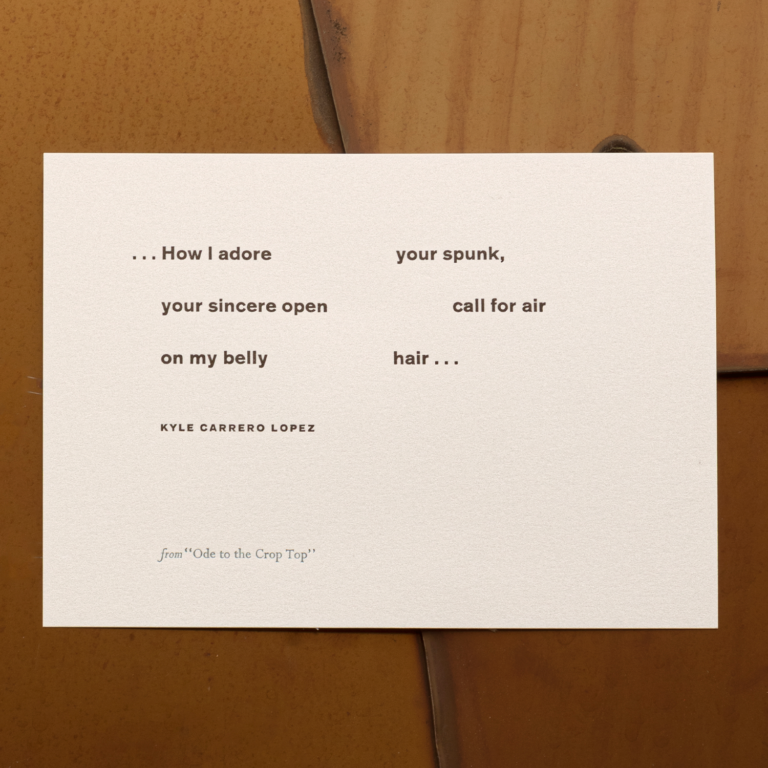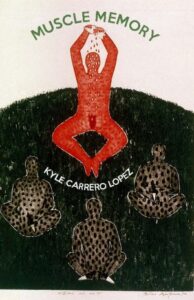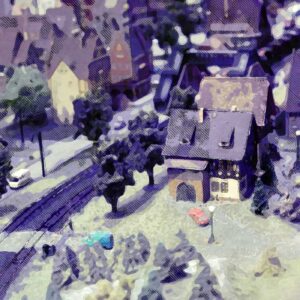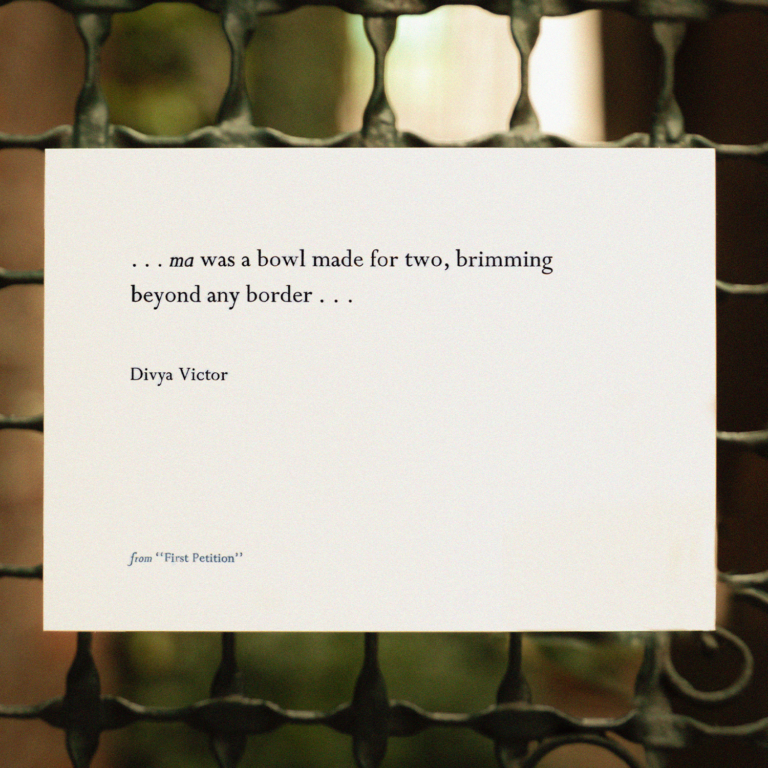Kyle Carrero Lopez
Ode to the Crop Top
A song of praise to the crop-top from a crop-top-wearing man who encounters comments in public and sings and swings.
We’re pleased to offer Kyle Carrero Lopez’s poem, and invite you to sign up here for the latest from Poetry Unbound.

Letterpress print by Myrna Keliher. Photography by Lucero Torres. © All Rights Reserved.
Guest

Kyle Carrero Lopez was born to Cuban parents in northern New Jersey. He is the author of the chapbook MUSCLE MEMORY, winner of the 2020 [PANK] Books Contest. He is also a founding member of LEGACY, a Brooklyn-based production collective by and for Black queer artists.
Transcript
Transcription by Heather Wang
Pádraig Ó Tuama: My name is Pádraig Ó Tuama, and a distinct memory I have is when I was about 11 or 12, I was on the way to an event with some young fellas from a church group, and in the back of the car, this friend of mine said, “Pádraig, you remind me of a girl.” And I knew what he was saying. And I said, “Which one?” And he said, “All of them.” And he meant it as an insult. This was 1986 or 1987. And I decided that I was going to say something that I wanted to believe, but didn’t quite believe at this stage, so I said, “Thanks very much. That’s a compliment.” And he didn’t know what to say. And I thought, maybe I’ll be OK, because all of my friends were girls, and they were magnificent. And the idea of being told that I reminded this guy of all of the girls in all of the world? I thought, that’s pretty fantastic.
[music: “Praise the Rain” by Gautam Srikishan]
“Ode to the Crop Top” by Kyle Carrero Lopez:
“O sliced crêpe;
dress code break;
half- set sun;
slut symbol;
cracked window;
short story;
a whole summer carnival, shrunk.
How I adore your spunk,
your sincere open call for air
on my belly hair.
“The little Target® boy
groaning eww as I pass
isn’t worth any ire.
He’s playing with fire,
but his parents lit the torch.
To think such small cloth
sparks grown brains aflame.
Why you in a girl’s top,
the man yells in DC.
I could have cut him one too,
so we’d both feel the breeze.”
[music: “Careless Morning” by Blue Dot Sessions]
I burst out laughing the first time I read this poem. What a magnificent ode to the crop top. I’ve heard of odes for years. An ode is a little hymn, a little praise, a song in adulation; sometimes of a person, sometimes of an event. And he gives the crop top so many names: a “sliced crêpe, a “dress code break,” a “slut symbol.” A crop top is like a T-shirt where most of the midriff has been removed so that you can see the torso, see the back, have the wind on your skin. And this is the central point of praise in Kyle Carrero Lopez’s brilliant poem. He uses this “such small cloth” to do a reflection on, when he dresses the way he wants to, how do the responses come from the public, back to him?
The word “ode” is an old word in poetry. It comes from Greek and means to sing, or chant, and often, an ode was used to mark public events or a time of joy or celebration. And sometimes an ode was used to call down a Greek god, and I love that meaning of the word “ode,” for this poem, because I feel like Kyle Carrera Lopez isn’t calling down a Greek god, but embodying some divine being, saying: Look how I’m dressing. Isn’t it fantastic?
[music: “Gambrel” by Blue Dot Sessions]
This is a 20-line poem, but each line is split in the middle, too; so there’s a long, swishing column down the middle of the poem, and this gives great style. I find myself thinking of a path that somebody walks, in the way they want — not in a straight line, but moving left and right, going in whatever direction they want — that line of emptiness going down through the middle of the poem.
As a result of this, there’s a line break between every line, but also, there’s a break in the middle of every line. The line “I could have cut him one too” has a break between “him” and “one.” So this line can be understood in two ways: I could have cut him one, too — saying, Do you want a crop top, as well? — or, I could have cut him. And some of this is so deft, especially in the line “How I adore your spunk, / your sincere open call for air / on my belly hair.” There’s a break between “belly” and “hair” in the same line, and this line, therefore, can mean so much. But it’s teasing and sexual and playful. ““How I adore your spunk, / your sincere open call for air” — it could end there. And it also could end with “your sincere open call for air / on my belly.” But he gives even more, by saying, “on my belly hair.”
This is a delicious poem. It’s a joy to read it. It’s fun to read it. But it’s also fun to engage the magnificent spirit of freedom, invitation, and magnificence of queering questions to do with gender and sex and clothing and perception that’s happening throughout the poem.
[music: “Outstretched Hand” by Gautam Srikishan]
The whole way throughout this poem, there’s a luscious and subtle and playful and sexual response to language; I mean, first of all when he’s describing the names for a crop top: “slut symbol,” “cracked window,” “short story,” “a whole summer carnival, shrunk. / How I adore your spunk.” The rhythm, the rhyme, the beautiful language, the way it flows from one to the other is amazing.
Also, the middle of this poem has a long, swaying, sashaying gap of air going through it. This poem, too, breathes, because It is speaking about what does it feel like to have breath, to have air, to have some space? And in that, when the voices of critique come in — that “little Target® boy / groaning eww” and then the guy in D.C. saying, “Why you in a girl’s top,” — in both of these he’s able to see beyond what’s happening in the moment.
There’s all kinds of ways within which the subtext of this poem is saying: How did you get to the stage of knowing how to think maturely; how to think playfully; how to think, but isn’t it great to have some air in your belly? Isn’t it magnificent to feel free? Isn’t it magnificent to dress the way you want, knowing that cloth has no gender? Wear what you wish to wear.
[music: “Cornicob” by Blue Dot Sessions]
I often wonder, when it comes to a poem, why it needed to be written; why it needed to be written by the poet themselves, but also, why it needed to be written to the world. Why did the great world call out a poem like this, from this particular poet? One of the reasons why I think this poem needed to be written is because it’s not just a defense or an apology. It’s a celebration. There is so much self-confidence and acceptance and sensuality, to wear what you want and celebrate the feeling of air, and even offer that to your detractors: “I could have cut him one too, / so we’d both feel the breeze.” This is saying: Do you want to feel the air in your belly hair, too?
This is an ode, not an apology. Kyle Carrera Lopez, I think, knows threat and shame and shouting because of how you choose to dress. In the face of comments in public about what he’s wearing and who he is, Kyle Carrero Lopez doesn’t owe anybody anything. He doesn’t have to give a defense, and he shouldn’t have to hear the things that he’s hearing in public. And what is so brilliant about this poem is that this poem isn’t a matter of obligation to defend what you look like. It is thriving. It is speaking from adulation and joy and creativity, and also invitation into a new way of being.
[music: “The House You Wake In” by Gautam Srikishan]
“Ode to the Crop Top” by Kyle Carrero Lopez:
“O sliced crêpe;
dress code break;
half- set sun;
slut symbol;
cracked window;
short story;
a whole summer carnival, shrunk.
How I adore your spunk,
your sincere open call for air
on my belly hair.
“The little Target® boy
groaning eww as I pass
isn’t worth any ire.
He’s playing with fire,
but his parents lit the torch.
To think such small cloth
sparks grown brains aflame.
Why you in a girl’s top,
the man yells in DC.
I could have cut him one too,
so we’d both feel the breeze.”
[music: “Praise the Rain” by Gautam Srikishan]
Chris Heagle: Thank you to Kyle Carrero Lopez, who gave us permission to use his poem, “Ode to the Crop Top.” Read it on our website, at onbeing.org.
[music: “Praise the Rain” by Gautam Srikishan]
Poetry Unbound is: Gautam Srikishan, Erin Colasacco, Eddie Gonzalez, Lilian Vo, Lucas Johnson, and me, Chris Heagle.
Our music is composed and provided by Gautam Srikishan and Blue Dot Sessions.
This podcast is produced by On Being Studios, which is located on Dakota land. You may enjoy our other podcasts: On Being with Krista Tippett, Becoming Wise, and This Movie Changed Me. Find those wherever you’d like to listen, or visit us at onbeing.org to find out more.
Books & Music
Recommended Reading
The On Being Project is an affiliate partner of Bookshop.org and Amazon.com. Any earnings we receive through these affiliate partnerships go into directly supporting The On Being Project.










